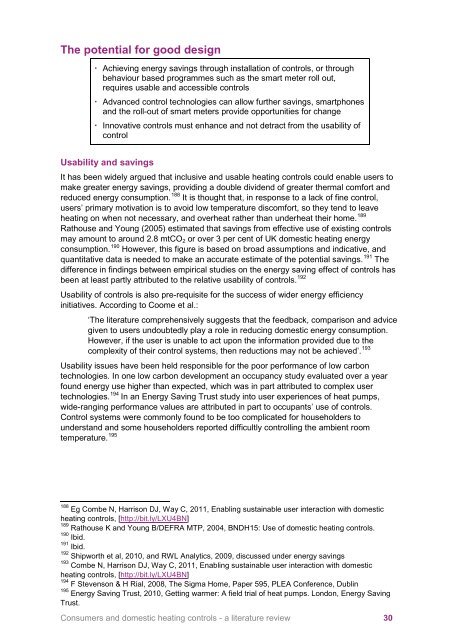Consumers-and-domestic-heating-controls-a-literature-review
Consumers-and-domestic-heating-controls-a-literature-review
Consumers-and-domestic-heating-controls-a-literature-review
You also want an ePaper? Increase the reach of your titles
YUMPU automatically turns print PDFs into web optimized ePapers that Google loves.
The potential for good design<br />
� Achieving energy savings through installation of <strong>controls</strong>, or through<br />
behaviour based programmes such as the smart meter roll out,<br />
requires usable <strong>and</strong> accessible <strong>controls</strong><br />
� Advanced control technologies can allow further savings, smartphones<br />
<strong>and</strong> the roll-out of smart meters provide opportunities for change<br />
� Innovative <strong>controls</strong> must enhance <strong>and</strong> not detract from the usability of<br />
control<br />
Usability <strong>and</strong> savings<br />
It has been widely argued that inclusive <strong>and</strong> usable <strong>heating</strong> <strong>controls</strong> could enable users to<br />
make greater energy savings, providing a double dividend of greater thermal comfort <strong>and</strong><br />
reduced energy consumption. 188 It is thought that, in response to a lack of fine control,<br />
users’ primary motivation is to avoid low temperature discomfort, so they tend to leave<br />
<strong>heating</strong> on when not necessary, <strong>and</strong> overheat rather than underheat their home. 189<br />
Rathouse <strong>and</strong> Young (2005) estimated that savings from effective use of existing <strong>controls</strong><br />
may amount to around 2.8 mtCO2 or over 3 per cent of UK <strong>domestic</strong> <strong>heating</strong> energy<br />
consumption. 190 However, this figure is based on broad assumptions <strong>and</strong> indicative, <strong>and</strong><br />
quantitative data is needed to make an accurate estimate of the potential savings. 191 The<br />
difference in findings between empirical studies on the energy saving effect of <strong>controls</strong> has<br />
been at least partly attributed to the relative usability of <strong>controls</strong>. 192<br />
Usability of <strong>controls</strong> is also pre-requisite for the success of wider energy efficiency<br />
initiatives. According to Coome et al.:<br />
‘The <strong>literature</strong> comprehensively suggests that the feedback, comparison <strong>and</strong> advice<br />
given to users undoubtedly play a role in reducing <strong>domestic</strong> energy consumption.<br />
However, if the user is unable to act upon the information provided due to the<br />
complexity of their control systems, then reductions may not be achieved’. 193<br />
Usability issues have been held responsible for the poor performance of low carbon<br />
technologies. In one low carbon development an occupancy study evaluated over a year<br />
found energy use higher than expected, which was in part attributed to complex user<br />
194<br />
technologies. In an Energy Saving Trust study into user experiences of heat pumps,<br />
wide-ranging performance values are attributed in part to occupants’ use of <strong>controls</strong>.<br />
Control systems were commonly found to be too complicated for householders to<br />
underst<strong>and</strong> <strong>and</strong> some householders reported difficultly controlling the ambient room<br />
temperature. 195<br />
188 Eg<br />
Combe N, Harrison DJ, Way C, 2011, Enabling sustainable user interaction with <strong>domestic</strong><br />
<strong>heating</strong> <strong>controls</strong>, [http://bit.ly/LXU4BN]<br />
189<br />
Rathouse K <strong>and</strong> Young B/DEFRA MTP, 2004, BNDH15: Use of <strong>domestic</strong> <strong>heating</strong> <strong>controls</strong>.<br />
190<br />
Ibid.<br />
191<br />
Ibid.<br />
192<br />
Shipworth et al, 2010, <strong>and</strong> RWL Analytics, 2009, discussed under energy savings<br />
193<br />
Combe N, Harrison DJ, Way C, 2011, Enabling sustainable user interaction with <strong>domestic</strong><br />
<strong>heating</strong> <strong>controls</strong>, [http://bit.ly/LXU4BN]<br />
194<br />
F Stevenson & H Rial, 2008, The Sigma Home, Paper 595, PLEA Conference, Dublin<br />
195<br />
Energy Saving Trust, 2010, Getting warmer: A field trial of heat pumps. London, Energy Saving<br />
Trust.<br />
<strong>Consumers</strong> <strong>and</strong> <strong>domestic</strong> <strong>heating</strong> <strong>controls</strong> - a <strong>literature</strong> <strong>review</strong> 30


